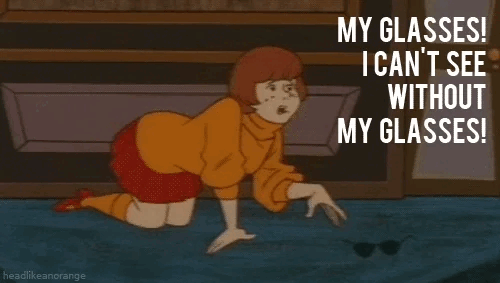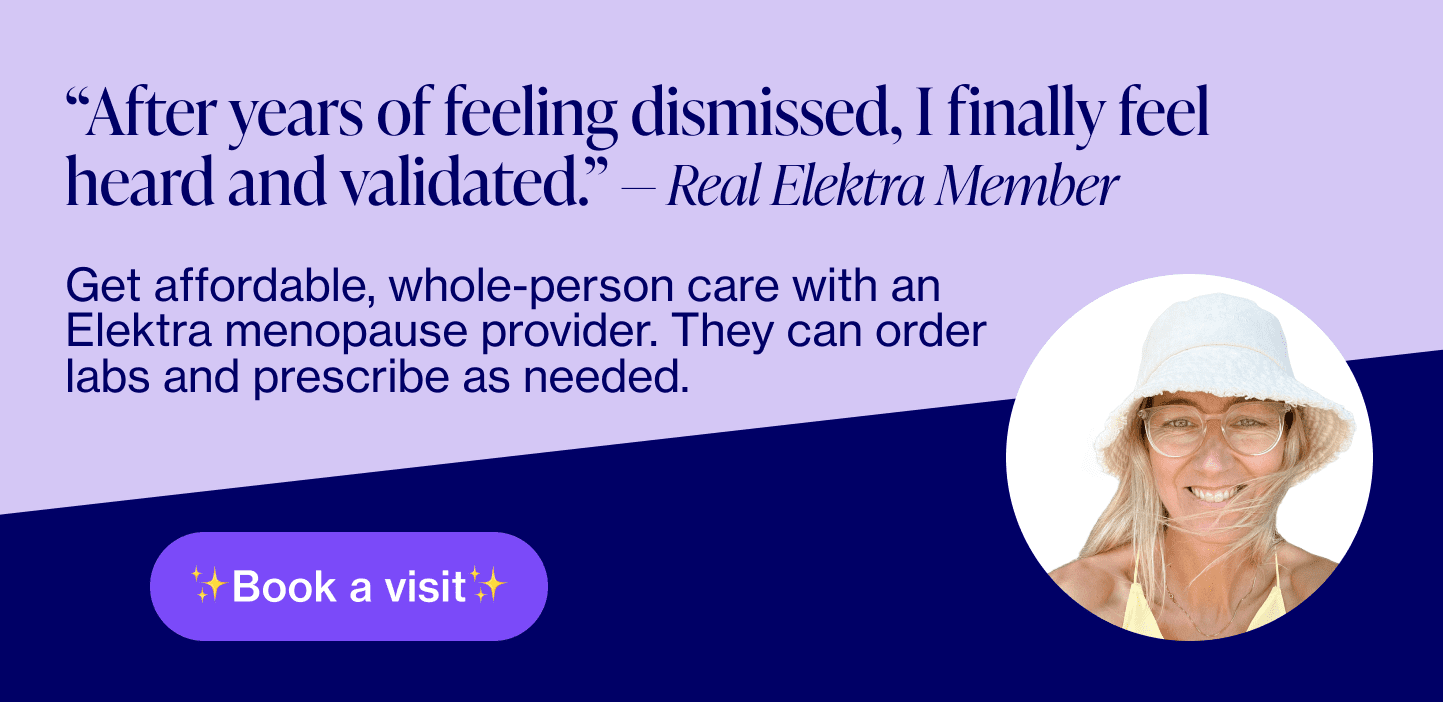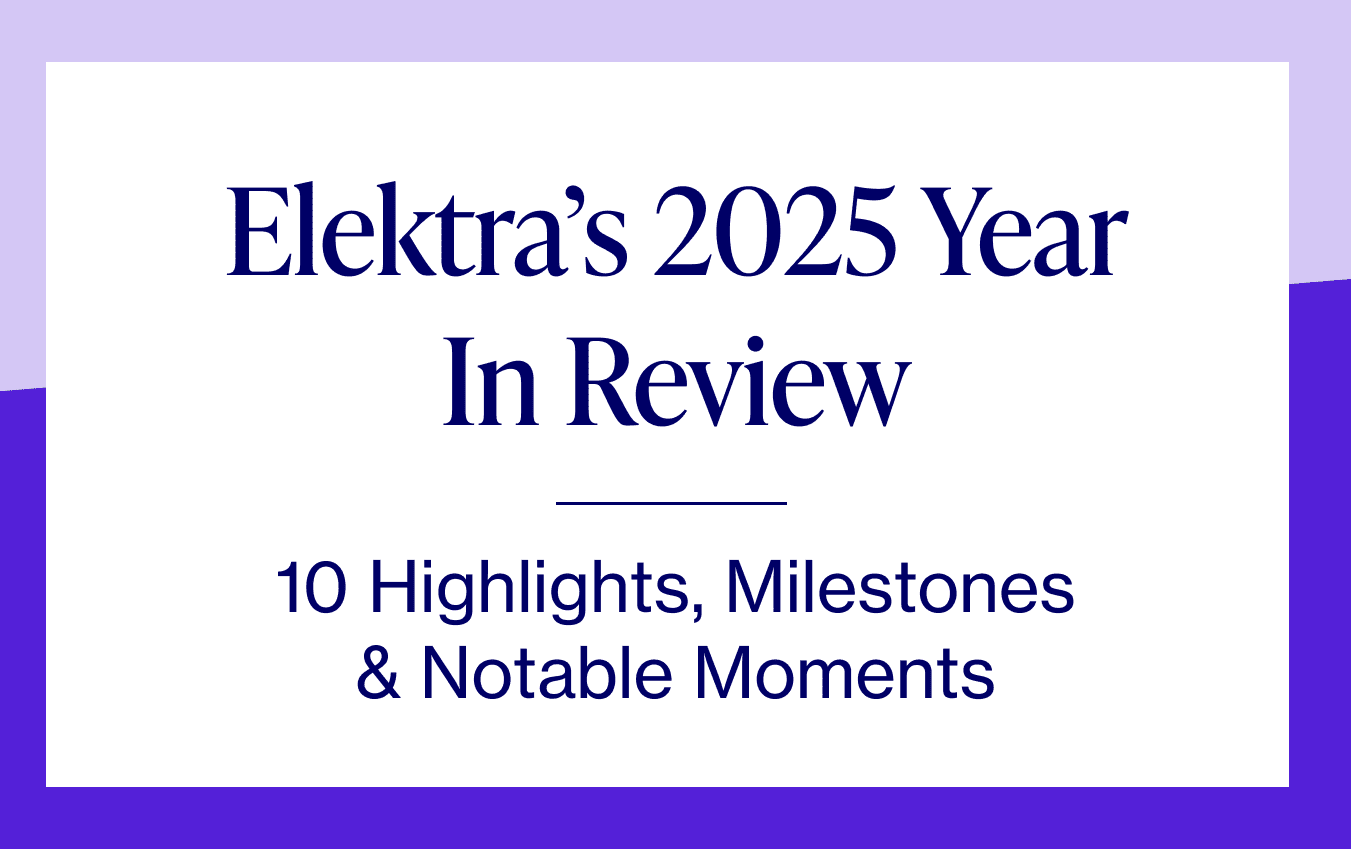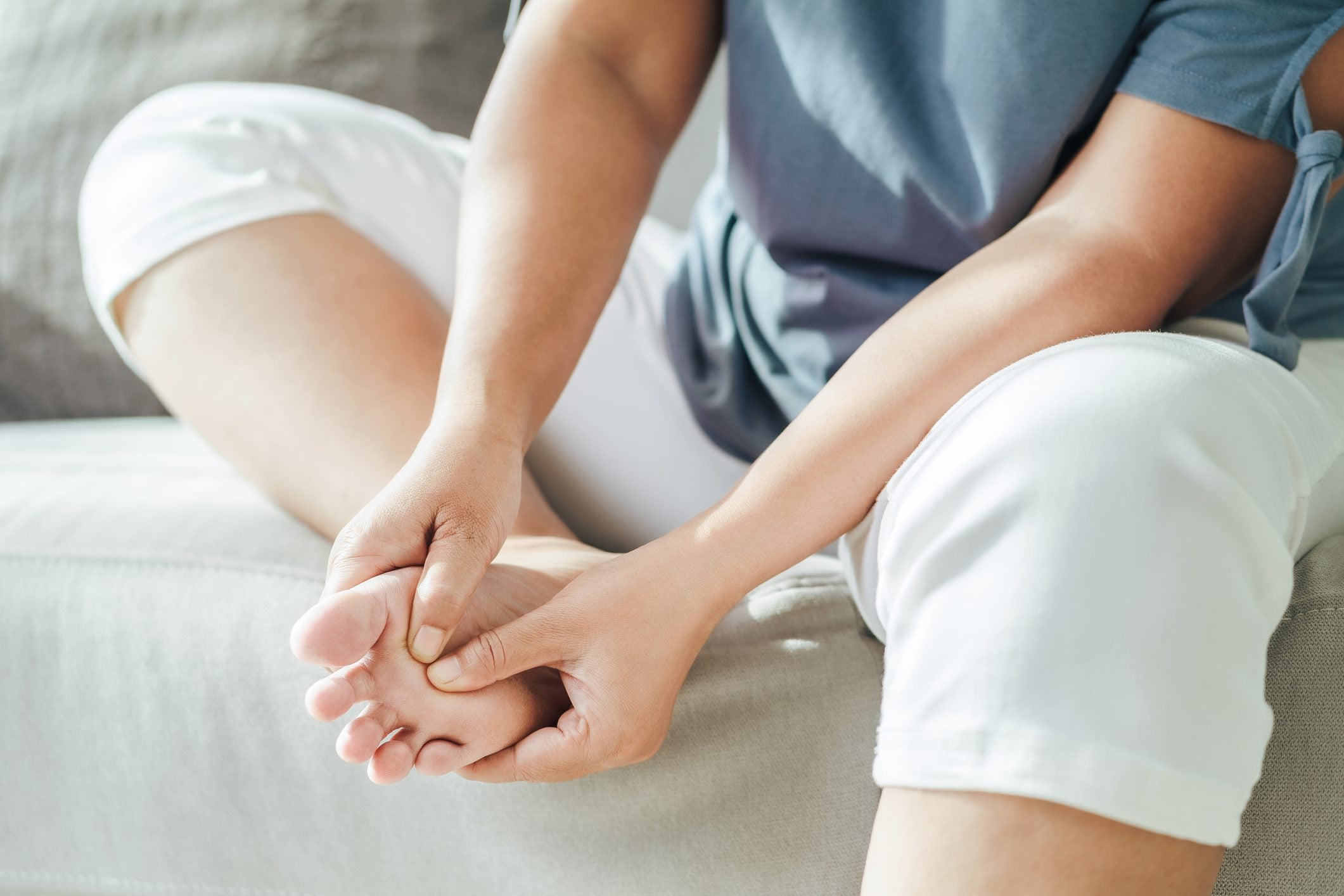
Published on Aug 26, 2024
Last modified on Aug 25, 2025
How Menopause Affects Eye Health and Eyesight
5 min read
Dealing with random eye issues all of a sudden around the menopause transition? Sorry to say, hormonal fluctuations may be the culprit, yet again. But not all hope is lost — there’s plenty we can do to address this symptom. Let’s take a look at the connection between eye health and menopause.
Eye symptoms and menopause
Dryness
As estrogen and progesterone levels decline during perimenopause, so too does hydration — which can lead to dry eyes (as well as dry skin). Specifically, we’re talking about decreased tear production; tears are made up of water, oil, and lipids, and help keep our eyes lubricated, in addition to protecting from infection. So, decreased tear production = less lubrication, and drier, itchier, less protected eyes.
Elektra Coach Grace Veras Sealy shared her own surprise about this symptom as she entered perimenopause:
“Eye problems were a novel and unwelcome perimenopause surprise for me. Not only has my prescription been changing every year, after having the same one for over 20 years, but my eyes now become dry and itchy more often than ever before.”
This symptom can be exacerbated by overexposure to screens — which between computers, television, and phones — most of us are. Dry climates, contact lenses, and certain medications such as antihistamines, antidepressants and acne medication can also play a role.
READ MORE: Elektra Coach Grace Veras Sealy Shares Her Personal Experience On HRT
Blurred vision
Many women experience blurred vision during periods of hormonal change, including pregnancy and menopause. As estrogen levels decline, our corneas (the clear front surface of our eyes) can stiffen due to decreased oil production, which can affect how light is refracted through the eyes, resulting in blurred vision.
Outside of hormones, certain health conditions such as diabetes and high blood pressure can also cause vision changes.
Glaucoma
Glaucoma is a group of eye conditions that cause damage to the optic nerve, which is responsible for sending visual information from the eye to the brain — effectively allowing us to see. Typically, damage to the optic nerve is caused by an increase in intraocular pressure or IOP (which is a science-y term for eye pressure), as in the case of glaucoma. Increased IOP is correlated with an increased risk of developing glaucoma, and studies have shown that postmenopausal women experience higher IOP compared to premenopausal women. When left untreated, the condition can result in permanent vision loss and blindness.
The good(ish) news? Glaucoma isn’t caused by menopause alone — the main factor here is age, regardless of sex. While damage caused to the eyes by glaucoma can’t be reversed, there are treatment options including oral medication, surgery, and prescription eye drops that can prevent further damage.
Cataracts
While the relationship between cataracts and menopause is unclear, the prevalence of the condition is higher in postmenopausal women than men of the same age. Around age 60, women with glaucoma may begin experiencing signs, which can include glare or light sensitivity, blurry vision, and trouble seeing at night. Cataracts can be treated with phacoemulsification, a safe and effective surgery in which the cloudy part of the lens is removed and replaced with an intraocular lens implant.
Age-related macular degeneration (AMD)
First, let us say that age-related macular degeneration isn’t necessarily as scary as it sounds — and it isn’t caused by menopause, but often does set in around the time of menopause.
The disease that can cause blurriness or blind spots (either dark or blurred) in the center of your vision, along with problems in depth perception. It’s caused by the growth of abnormal blood vessels under the center of the retina. While there is currently no cure for AMD, early detection and treatment can inhibit progression, which makes staying up-to-date with your check-ups and eye exams so important.
Is there anything you can really do to improve eye health?
Wear sunglasses
Shades are important for more than just accessorizing and are necessary for protecting our eyes from UV rays, which can increase our risk of developing cataracts or AMD. Try to find a pair that blocks 99% to 100% of both UVA and UVB rays.
Get your nutrition game on
Diet is a key factor when it comes to managing several symptoms of menopause, including eye problems. If you’re already following the Mediterranean Diet, then congratulations — you don’t need to change much. Our staff favorite diet is rich in antioxidants, minerals, and vitamins that can help improve eye health:
- Lutein & zeaxanthin: may reduce risk of chronic eye diseases like cataracts, and can be found in dark leafy greens, broccoli, and tangerines. (Hint: eat the rainbow.)
- Omega-3 fatty acids: may help support retinal function and improve tear production. Find them in cold-water fish like salmon and tuna.
- Vitamin A, C, and E: may aid in the prevention of macular degeneration, and can be found in carrots, sweet potato, and citrus.
Keep artificial tears on hand
Over-the-counter eye drops can help with symptoms of dry eye by keeping the watery part of your eye lubricated. Make sure to use preservative-free topical formulations when possible. In severe cases, eye doctors may recommend prescription eye drops that target the tear film directly and help the eye to produce more tears naturally. Here are some we like:
- Blink GelTears Lubricating Dry Eye Drops
- SYSTANE® COMPLETE Preservative-Free Eye Drops
- Refresh Optive MEGA-3
Limit screen time
Okay, we pretty much all need to hear this (especially us media multitaskers doing some online shopping while we watch TV). Experts recommend the 20-20-20 rule to alleviate digital eye strain: look away from your screen every 20 minutes and look at something ~20 feet away for ~20 seconds.
Prioritize exercise
We say it all the time, but exercise is important for just about everything when it comes to menopause, and that includes eyesight. Moving your body regularly is important for the prevention of cardiometabolic conditions including type 2 diabetes, which can damage eye health.
READ MORE: 3 Exercises For Menopause To Try This Year
What about menopausal hormone therapy (MHT)?
Studies on the impact of MHT (previously known as hormone replacement therapy/HRT) are limited and share contradictory findings, but there are some anecdotal reports of symptom improvement with estrogen therapy.
The Bottom Line
Compared to whole-body symptoms of menopause like hot flashes and joint pain, eye changes can be easy to write off, but should be taken seriously. If you’re experiencing new or worsening eye problems during the menopause transition, it’s important to speak with a healthcare provider or optometrist.
READ MORE: Why Are My Ears Ringing? Menopause and Tinnitus Explained



